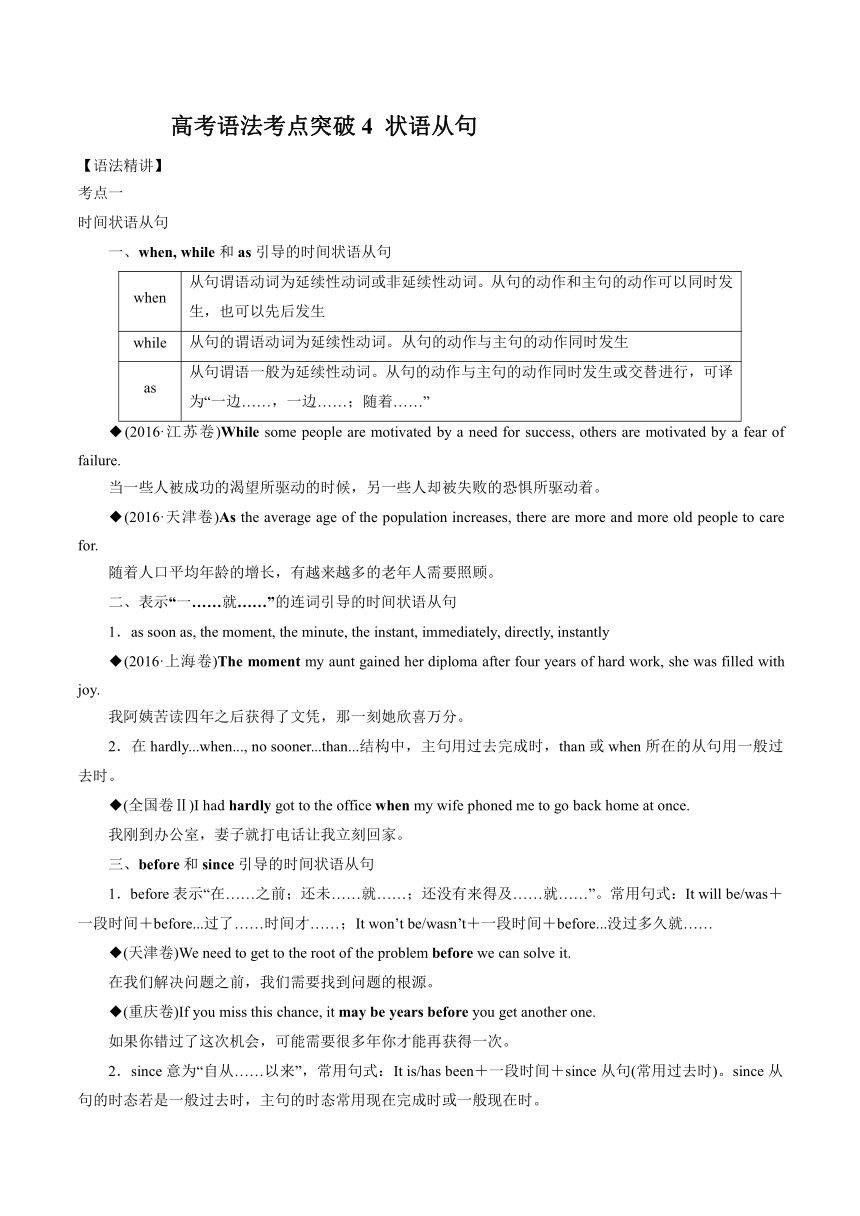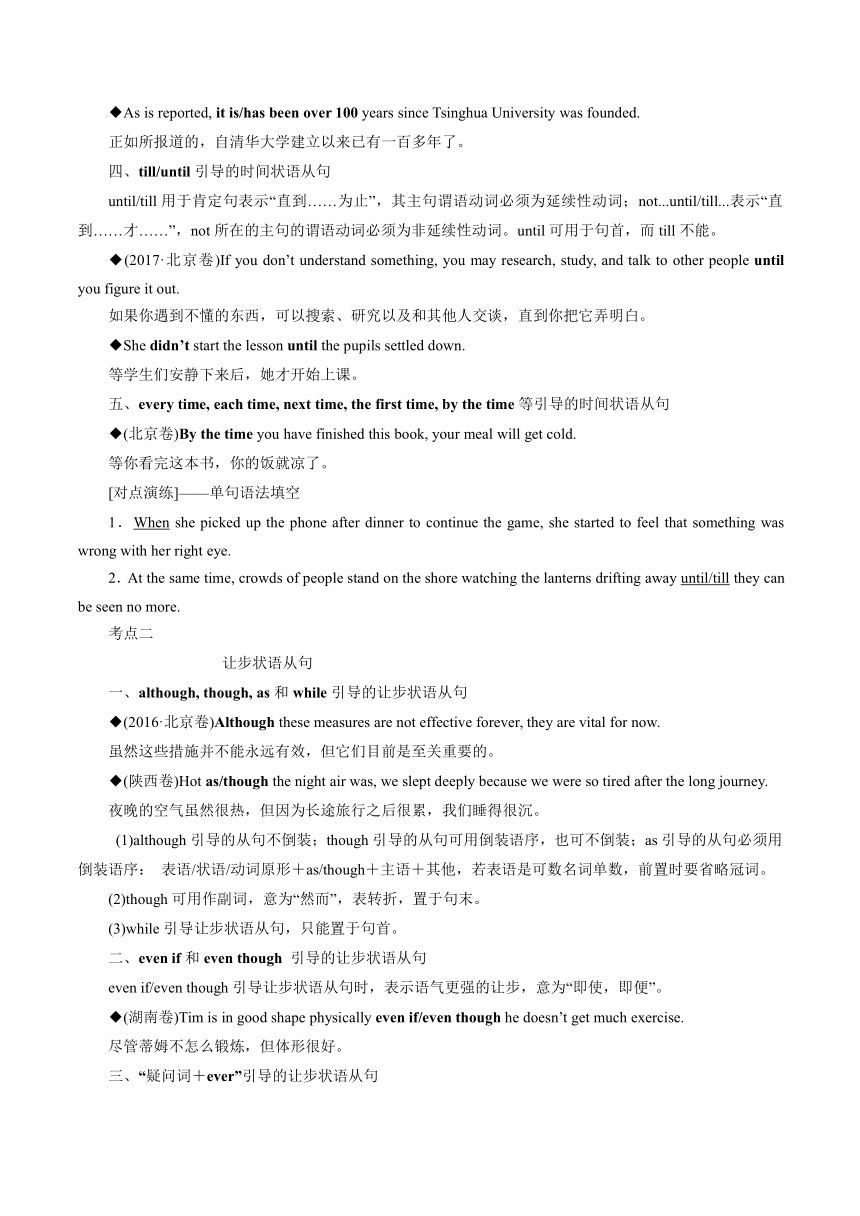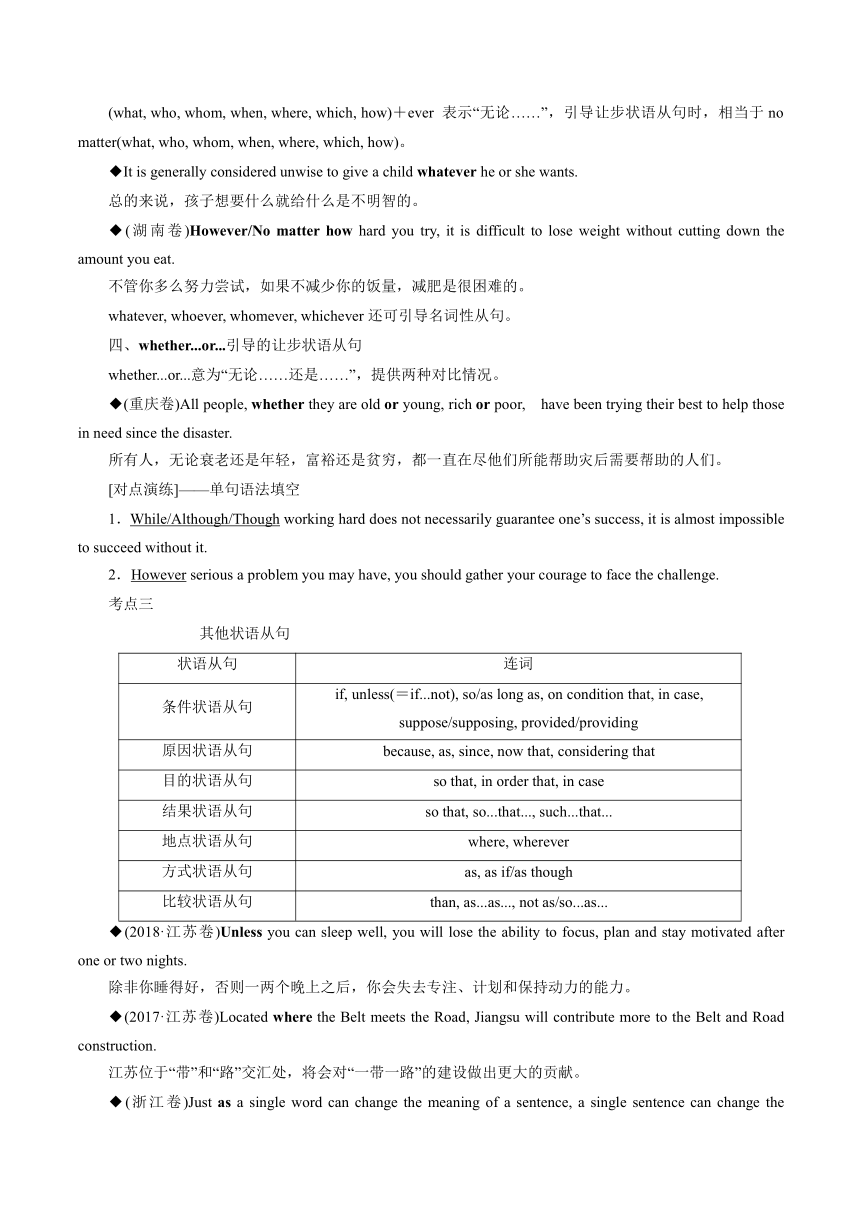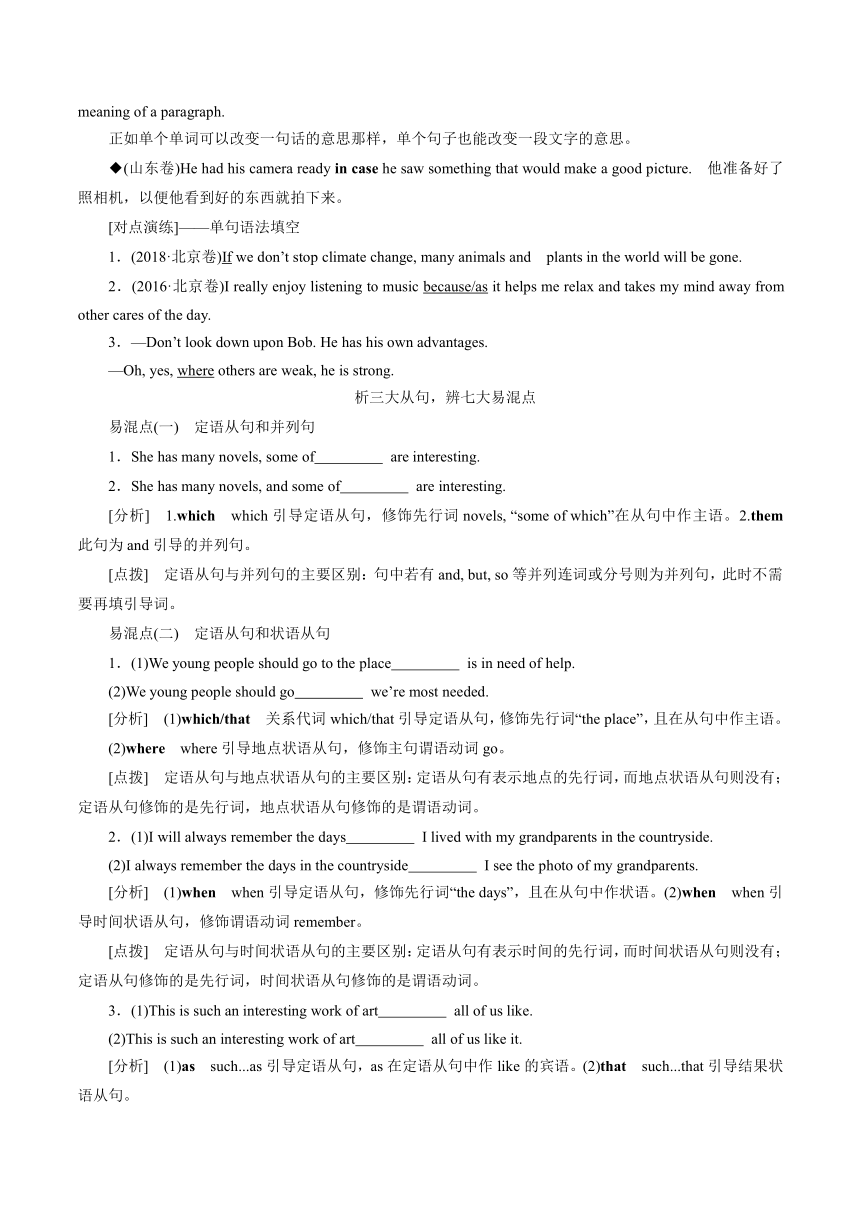高考语法考点突破4:状语从句(含解析)
图片预览




文档简介
高考语法考点突破4
状语从句
【语法精讲】
考点一
时间状语从句
一、when,
while和as引导的时间状语从句
when
从句谓语动词为延续性动词或非延续性动词。从句的动作和主句的动作可以同时发生,也可以先后发生
while
从句的谓语动词为延续性动词。从句的动作与主句的动作同时发生
as
从句谓语一般为延续性动词。从句的动作与主句的动作同时发生或交替进行,可译为“一边……,一边……;随着……”
◆(2016·江苏卷)While
some
people
are
motivated
by
a
need
for
success,
others
are
motivated
by
a
fear
of
failure.
当一些人被成功的渴望所驱动的时候,另一些人却被失败的恐惧所驱动着。
◆(2016·天津卷)As
the
average
age
of
the
population
increases,
there
are
more
and
more
old
people
to
care
for.
随着人口平均年龄的增长,有越来越多的老年人需要照顾。
二、表示“一……就……”的连词引导的时间状语从句
1.as
soon
as,
the
moment,
the
minute,
the
instant,
immediately,
directly,
instantly
◆(2016·上海卷)The
moment
my
aunt
gained
her
diploma
after
four
years
of
hard
work,
she
was
filled
with
joy.
我阿姨苦读四年之后获得了文凭,那一刻她欣喜万分。
2.在hardly...when...,
no
sooner...than...结构中,主句用过去完成时,than或when所在的从句用一般过去时。
◆(全国卷Ⅱ)I
had
hardly
got
to
the
office
when
my
wife
phoned
me
to
go
back
home
at
once.
我刚到办公室,妻子就打电话让我立刻回家。
三、before和since引导的时间状语从句
1.before表示“在……之前;还未……就……;还没有来得及……就……”。常用句式:It
will
be/was+一段时间+before...过了……时间才……;It
won’t
be/wasn’t+一段时间+before...没过多久就……
◆(天津卷)We
need
to
get
to
the
root
of
the
problem
before
we
can
solve
it.
在我们解决问题之前,我们需要找到问题的根源。
◆(重庆卷)If
you
miss
this
chance,
it
may
be
years
before
you
get
another
one.
如果你错过了这次机会,可能需要很多年你才能再获得一次。
2.since意为“自从……以来”,常用句式:It
is/has
been+一段时间+since从句(常用过去时)。since从句的时态若是一般过去时,主句的时态常用现在完成时或一般现在时。
◆As
is
reported,
it
is/has
been
over
100
years
since
Tsinghua
University
was
founded.
正如所报道的,自清华大学建立以来已有一百多年了。
四、till/until引导的时间状语从句
until/till用于肯定句表示“直到……为止”,其主句谓语动词必须为延续性动词;not...until/till...表示“直到……才……”,not所在的主句的谓语动词必须为非延续性动词。until可用于句首,而till不能。
◆(2017·北京卷)If
you
don’t
understand
something,
you
may
research,
study,
and
talk
to
other
people
until
you
figure
it
out.
如果你遇到不懂的东西,可以搜索、研究以及和其他人交谈,直到你把它弄明白。
◆She
didn’t
start
the
lesson
until
the
pupils
settled
down.
等学生们安静下来后,她才开始上课。
五、every
time,
each
time,
next
time,
the
first
time,
by
the
time等引导的时间状语从句
◆(北京卷)By
the
time
you
have
finished
this
book,
your
meal
will
get
cold.
等你看完这本书,你的饭就凉了。
[对点演练]——单句语法填空
1.When
she
picked
up
the
phone
after
dinner
to
continue
the
game,
she
started
to
feel
that
something
was
wrong
with
her
right
eye.
2.At
the
same
time,
crowds
of
people
stand
on
the
shore
watching
the
lanterns
drifting
away
until/till
they
can
be
seen
no
more.
考点二
让步状语从句
一、although,
though,
as和while引导的让步状语从句
◆(2016·北京卷)Although
these
measures
are
not
effective
forever,
they
are
vital
for
now.
虽然这些措施并不能永远有效,但它们目前是至关重要的。
◆(陕西卷)Hot
as/though
the
night
air
was,
we
slept
deeply
because
we
were
so
tired
after
the
long
journey.
夜晚的空气虽然很热,但因为长途旅行之后很累,我们睡得很沉。
(1)although引导的从句不倒装;though引导的从句可用倒装语序,也可不倒装;as引导的从句必须用倒装语序:
表语/状语/动词原形+as/though+主语+其他,若表语是可数名词单数,前置时要省略冠词。
(2)though可用作副词,意为“然而”,表转折,置于句末。
(3)while引导让步状语从句,只能置于句首。
二、even
if和even
though
引导的让步状语从句
even
if/even
though引导让步状语从句时,表示语气更强的让步,意为“即使,即便”。
◆(湖南卷)Tim
is
in
good
shape
physically
even
if/even
though
he
doesn’t
get
much
exercise.
尽管蒂姆不怎么锻炼,但体形很好。
三、“疑问词+ever”引导的让步状语从句
(what,
who,
whom,
when,
where,
which,
how)+ever
表示“无论……”,引导让步状语从句时,相当于no
matter(what,
who,
whom,
when,
where,
which,
how)。
◆It
is
generally
considered
unwise
to
give
a
child
whatever
he
or
she
wants.
总的来说,孩子想要什么就给什么是不明智的。
◆(湖南卷)However/No
matter
how
hard
you
try,
it
is
difficult
to
lose
weight
without
cutting
down
the
amount
you
eat.
不管你多么努力尝试,如果不减少你的饭量,减肥是很困难的。
whatever,
whoever,
whomever,
whichever还可引导名词性从句。
四、whether...or...引导的让步状语从句
whether...or...意为“无论……还是……”,提供两种对比情况。
◆(重庆卷)All
people,
whether
they
are
old
or
young,
rich
or
poor,
have
been
trying
their
best
to
help
those
in
need
since
the
disaster.
所有人,无论衰老还是年轻,富裕还是贫穷,都一直在尽他们所能帮助灾后需要帮助的人们。
[对点演练]——单句语法填空
1.While/Although/Though
working
hard
does
not
necessarily
guarantee
one’s
success,
it
is
almost
impossible
to
succeed
without
it.
2.However
serious
a
problem
you
may
have,
you
should
gather
your
courage
to
face
the
challenge.
考点三
其他状语从句
状语从句
连词
条件状语从句
if,
unless(=if...not),
so/as
long
as,
on
condition
that,
in
case,
suppose/supposing,
provided/providing
原因状语从句
because,
as,
since,
now
that,
considering
that
目的状语从句
so
that,
in
order
that,
in
case
结果状语从句
so
that,
so...that...,
such...that...
地点状语从句
where,
wherever
方式状语从句
as,
as
if/as
though
比较状语从句
than,
as...as...,
not
as/so...as...
◆(2018·江苏卷)Unless
you
can
sleep
well,
you
will
lose
the
ability
to
focus,
plan
and
stay
motivated
after
one
or
two
nights.
除非你睡得好,否则一两个晚上之后,你会失去专注、计划和保持动力的能力。
◆(2017·江苏卷)Located
where
the
Belt
meets
the
Road,
Jiangsu
will
contribute
more
to
the
Belt
and
Road
construction.
江苏位于“带”和“路”交汇处,将会对“一带一路”的建设做出更大的贡献。
◆(浙江卷)Just
as
a
single
word
can
change
the
meaning
of
a
sentence,
a
single
sentence
can
change
the
meaning
of
a
paragraph.
正如单个单词可以改变一句话的意思那样,单个句子也能改变一段文字的意思。
◆(山东卷)He
had
his
camera
ready
in
case
he
saw
something
that
would
make
a
good
picture. 他准备好了照相机,以便他看到好的东西就拍下来。
[对点演练]——单句语法填空
1.(2018·北京卷)If
we
don’t
stop
climate
change,
many
animals
and
plants
in
the
world
will
be
gone.
2.(2016·北京卷)I
really
enjoy
listening
to
music
because/as
it
helps
me
relax
and
takes
my
mind
away
from
other
cares
of
the
day.
3.—Don’t
look
down
upon
Bob.
He
has
his
own
advantages.
—Oh,
yes,
where
others
are
weak,
he
is
strong.
析三大从句,辨七大易混点
易混点(一) 定语从句和并列句
1.She
has
many
novels,
some
of
are
interesting.
2.She
has
many
novels,
and
some
of
are
interesting.
[分析] 1.which which引导定语从句,修饰先行词novels,
“some
of
which”在从句中作主语。2.them 此句为and引导的并列句。
[点拨] 定语从句与并列句的主要区别:句中若有and,
but,
so等并列连词或分号则为并列句,此时不需要再填引导词。
易混点(二) 定语从句和状语从句
1.(1)We
young
people
should
go
to
the
place
is
in
need
of
help.
(2)We
young
people
should
go
we’re
most
needed.
[分析] (1)which/that 关系代词which/that引导定语从句,修饰先行词“the
place”,且在从句中作主语。
(2)where where引导地点状语从句,修饰主句谓语动词go。
[点拨] 定语从句与地点状语从句的主要区别:定语从句有表示地点的先行词,而地点状语从句则没有;定语从句修饰的是先行词,地点状语从句修饰的是谓语动词。
2.(1)I
will
always
remember
the
days
I
lived
with
my
grandparents
in
the
countryside.
(2)I
always
remember
the
days
in
the
countryside
I
see
the
photo
of
my
grandparents.
[分析] (1)when when引导定语从句,修饰先行词“the
days”,且在从句中作状语。(2)when when引导时间状语从句,修饰谓语动词remember。
[点拨] 定语从句与时间状语从句的主要区别:定语从句有表示时间的先行词,而时间状语从句则没有;定语从句修饰的是先行词,时间状语从句修饰的是谓语动词。
3.(1)This
is
such
an
interesting
work
of
art
all
of
us
like.
(2)This
is
such
an
interesting
work
of
art
all
of
us
like
it.
[分析] (1)as such...as引导定语从句,as在定语从句中作like的宾语。(2)that such...that引导结果状语从句。
[点拨] 定语从句与结果状语从句的主要区别:the
same...as与such...as引导定语从句,
as在从句中充当一定的成分;such/so...that...引导结果状语从句,that在从句中不作成分。
易混点(三) 定语从句和名词性从句
1.(1)
is
known
to
everybody,
the
moon
travels
round
the
earth
once
every
month.
(2)
is
known
to
everybody
that
the
moon
travels
round
the
earth
once
every
month.
(3)
is
known
to
everybody
is
that
the
moon
travels
round
the
earth
once
every
month.
[分析] (1)As as引导非限制性定语从句,修饰后面这句话的内容。(2)It it作形式主语,真正的主语是that引导的从句。(3)What what在此引导主语从句,在从句中充当主语,而后面that引导的从句则是表语从句。
2.(1)
has
helped
to
save
the
drowning
girl
is
worth
praising.
(2)Anyone
has
helped
to
save
the
drowning
girl
is
worth
praising.
[分析] (1)Whoever whoever在此引导主语从句。(2)who who在此引导定语从句并在从句中作主语。
[点拨] 定语从句与主语从句的区别:定语从句是形容词性从句,其作用相当于一个形容词,在整个句子中作定语,用来修饰前面的名词或代词;而主语从句,其作用相当于一个名词,在整个句子中作主语。
3.(1)The
mother
made
a
promise
pleased
all
her
children.
(2)The
mother
made
a
promise
she
would
buy
new
toys.
[分析] (1)that/which that/which引导定语从句并在从句中作主语。(2)that that引导同位语从句。
[点拨] 定语从句与同位语从句的区别:定语从句是形容词性从句,其作用相当于一个形容词,用来修饰前面的名词或代词;同位语从句是名词性从句,其作用相当于一个名词,对前面的名词作进一步解释,同位语从句一般都与抽象名词同位。定语从句的引导词that在从句中充当一定的成分,可作主语、宾语、表语等,作宾语时可以省略;而同位语从句的引导词that在从句中只起连接作用,不作任何句子成分,且不能省略。
4.(1)My
uncle
is
the
owner
of
a
restaurant
close
to
the
place
is
the
center
of
the
town.
(2)My
uncle
is
the
owner
of
a
restaurant
close
to
I
live.
[分析] (1)which which引导定语从句并在从句中作主语。(2)where where引导宾语从句。
5.(1)Our
teacher
did
all
he
could
to
help
us.
(2)Our
teacher
did
he
could
to
help
us.
[分析] (1)that that引导定语从句并在从句中作宾语。(2)what what引导宾语从句。
6.(1)I
will
help
those
are
in
need
of
help.
(2)I
will
help
is
in
need
of
help.
[分析] (1)who who引导定语从句,并在从句中作主语。(2)whoever whoever引导宾语从句。
[点拨] 定语从句与宾语从句的区别:定语从句一般有先行词,从句是用来说明、描述先行词的,先行词用关系代词代替,在从句中充当成分(注意是在从句中作成分,如作宾语、主语等);而宾语从句则是整个从句在主句中作宾语,宾语从句就是主句的宾语,简单地说,动词、介词后面的从句基本上是宾语从句。
7.(1)She
was
not
she
used
to
be.
(2)She
was
not
the
woman
she
used
to
be.
[分析] (1)what what引导表语从句。(2)that that引导定语从句并在从句中作表语。
[点拨] 定语从句与表语从句的区别:表语从句是系动词后的句子;而定语从句是跟在一个名词后或句子后,对名词或句子起修饰或补充说明的作用。
易混点(四) 状语从句和固定句型
1.It
was
the
time
chinese
people
had
a
hard
life.
2.It
is
the
first
time
she
has
been
in
Shanghai.
[分析] 1.when when引导定语从句,并在从句中作状语。
2.that It
is
the
first/second/third...time...是固定句型。
易混点(五) 状语从句和并列句
1.
you
take
this
medicine,
you
will
be
all
right.
2.Take
this
medicine,
you
will
be
all
right.
[分析] 1.If if引导条件状语从句。2.and and连接两个并列句。
易混点(六) 状语从句和名词性从句
1.I’ll
try
my
best
to
help
him,
no
matter
turns
to
me
for
help.
2.I
will
try
my
best
to
help
turns
to
me
for
help.
3.
turns
to
me
for
help
is
welcome.
[分析] 1.who no
matter
who引导让步状语从句。2.whoever whoever引导宾语从句。3.Whoever Whoever引导主语从句,并在从句中作主语。
易混点(七) 状语从句和独立主格结构
1.
time
permits,
we’ll
go
camping.
2.Time
(permit),
we’ll
go
camping.
[分析] 1.If if引导条件状语从句。2.permitting 本句使用的是独立主格结构,其结构为:名词+分词。
【走进高考】
1.【2018·江苏】_______
you?can?sleep?well,?you?will?lose?the?ability?to?focus,?plan?and?stay
motivated?after
one
or?two?nights.
A.
Once
B.
Unless
C.
If
D.
When
【答案】B
【解析】考查连词词义辨析及语境理解。句意:除非你睡得好,否则一两个晚上之后,你会失去专注、计划和保持动力的能力。A.
Once一旦;B.
Unless除非;C.
If如果;D.
When当……时候。故选B。
2.【2018·天津】Let's
not
pick
these
peaches
until
this
weekend
___________they
get
sweet
enough
to
be
eaten.
A.
ever
since
B.
as
if
C.
even
though
D.
so
that
【答案】D
【解析】考查连词短语辨析及语境理解。句意:让我们这个周末再摘这些桃子,这样的话,它们吃起来就变得足够甜。A.
ever
since自那时起;B.
as
if好像;C.
even
though尽管;D.
so
that以便。从句为目的状语从句,故用so
that引导。故选D。
3.【2018·北京】_________
we
don’t
stop
climate
change,
many
animals
and
plants
in
the
world
will
be
gone.
A.
Although
B.
While
C.
If
D.
Until
【答案】C
【解析】考查状语从句。句意:如果我们不阻止气候变化,那么世界上的很多动植物都将会消失。动植物不灭绝的前提条件是阻止气候变化。Although
尽管
;While当……时候,尽管,然而;If如果;
Until直到。故选C正确。
4.【2017·北京】If
you
don’t
understand
something,
you
may
research,
study,
and
talk
to
other
people
_______
you
figure
it
out.
A.
because
B.
though
C.
until
D.
since
【答案】C
【解析】
A.
because
因为
B.
though尽管
C.
until直到
D.
since自从
句意:如果你无法理解某个东西,你可能会去研究,学习和他人探讨直到你解决为止,根据句意可知选用until,直到,选C。
5.【2017·北京】______
birds
use
their
feathers
for
flight,
some
of
their
feathers
are
for
other
purposes.
A.
Once
B.
If
C.
Although
D.
Because
【答案】C
【解析】A.
Once
一旦
B.
If如果
C.
Although尽管
D.
Because因为。句意:尽管鸟儿们用羽毛来飞翔,但是他们的一些羽毛还有其他用途。根据语境可知前后之间是让步关系,故选C。
6.【2017·北京】—Peter,
please
send
us
postcards
______
we’ll
know
where
you
have
visited.
—No
problem.
A.
but
B.
or
C.
for
D.
so
【答案】D
【解析】A.
but
但是
B.
or
或者
C.
for
因为
D.
so因此
句意:
Peter,请给我们寄明信片,因此我们就会知道你们去哪游览过,根据语境可知前后句之间是因果关系,故用so,选D。
7.【2017·江苏】Located
_______
the
Belt
meets
the
Road,
Jiangsu
will
contribute
more
to
the
Belt
and
Road
construction.
A.
why
B.
when
C.
which
D.
where
【答案】D
【解析】考查状语从句。be
located
in+地点名词,位于/坐落某地,where引导的地点状语从句在此相当于in
some
place,故选D。句意:位于丝绸之路交汇处的江苏省将会对
“一带一路”的建设做出更大的贡献。
8.【2016·北京】My
grandfather
still
plays
tennis
now
and
then,
________
he’s
in
his
nineties.
A.
as
long
as
B.
as
if
C.
even
though
D.
in
case
【答案】C
【解析】考查状语从句。句意:即使是九十多岁了,我的爷爷仍然时不时地打打网球。A.
as
long
as只要,引导条件句;B.
as
if似乎,引导方式状语从句或表语从句;C.
even
though即使,引导让步状语从句;D.
in
case以防,引导目的状语从句。这里是转折关系,故选C。
9.【2016·北京】I
am
not
afraid
of
tomorrow,
________
I
have
seen
yesterday
and
I
love
today.
A.
so
B.
and
C.
for
D.
but
【答案】C
【解析】考查并列连词。句意:我不害怕明天,因为我已经经历了昨天并且深爱着今天。so后跟结果;and表并列关系;for补充说明原因;but表转折。故选C。
10.【2016·江苏】______some
people
are
motivated
by
a
need
for
success,
others
are
motivated
by
a
fear
of
failure.
A.
Because
B.
If
C.
Unless
D.
While
【答案】D
【解析】考察连词。连词because因为;If如果;unless除非,如果…不…;while尽管,然而,当……时;句意:尽管一些人被成功的渴望驱使着,但是其他人却被失败的恐惧驱使着前进。根据句意可知上下文之间存在转折关系,所以使用“while尽管…
”连接。故选D。
【2019模拟题】
1.(2019·广东湛江调研)Always
be
grateful
to
other
people’s
kindness
and
show
your
gratitude
through
the
words
that
you
speak.
You
will
make
further
progress
you
express
your
gratitude
in
time.
2.(2019·四川成都诊断)In
a
talk
at
Tsinghua
University
in
Beijing,
Zuckerberg
spoke
Chinese
for
about
30
minutes.
his
Chinese
was
far
from
perfect,
the
students
cheered
his
effort.
3.(2019·郑州第一次质量预测)I
was
touched
that
I
couldn’t
sleep
the
whole
night,
and
thought
about
being
a
teacher
in
the
future.
4.(2019·安徽蚌埠一模)People
in
Dali
are
very
friendly
and
honest
to
you
you
are
a
foreigner
or
just
a
local.
5.(2019·江苏南京模拟)These
young
people
are
not
suitable
for
such
a
simple
job
in
an
office
they
are
adventurous
and
creative
in
nature.
6.(2019·江苏淮安淮海中学段考)The
visitor
asked
to
have
his
picture
taken
stood
the
famous
tower.
7.(2019·山东滨州期中)—How
long
do
you
think
it
is
he
arrived
here?
—No
more
than
half
a
year,
I
believe.
8.(2019·江苏苏锡常镇四市调研)
the
Internet
is
bridging
the
distance
between
people,
it
may
also
be
breaking
some
homes
or
will
cause
other
family
problems.
9.(2019·广西钦州第一次质检)The
house
was
greatly
damaged
by
the
truck
and
we’d
better
leave
it
it
is
until
the
police
arrive.
10.(2019·黑龙江大庆四校阶段联考)It
wasn’t
long
I
learned
how
to
develop
respectful
relationships
with
my
bosses
and
what
tone
of
voice
to
use
with
kids.
答案与解析
1.because 解析:句意:这些年轻人不适合办公室里这么简单的工作,因为他们天生具有冒险精神并富有创造力。此处表示直接原因,故填because。
2.if/once/when 解析:空处所在句的句意:如果/一旦/当你能及时表达你的感激之情(时),你会取得更大进步。根据语境可知,设空处引导条件/时间状语从句,故填if/once/when。
3.Though/Although/While 解析:后句句意:尽管他的汉语很不完美,但学生们为他的努力喝彩。由句意可知,设空处引导让步状语从句,表示“尽管”,故可用Though/Although/While引导。
4.so 解析:考查副词。根据固定句型so...that...“如此……以至于……”可知,应用副词so。
5.whether 解析:句意:大理的人对你友好而真诚,无论你是外国人还是当地居民。whether...or...表示“无论是……还是……”,引导让步状语从句。
6.where 解析:句意:那位游客要求在那座著名的塔那儿拍照。stood
the
famous
tower使用了倒装结构,主语是the
famous
tower,谓语是stood,设空处在句中作地点状语,表示“在……地方”。
7.since 解析:It
is+时间段+since
sb.
did
sth.
为固定句型,意为“自从某人做某事到现在有多久了”。8.While 解析:考查连词用法。句意:虽然网络正在搭起人们之间距离的桥梁,但是它也可能使一些家庭破裂或导致一些其他家庭问题。while意为“然而,虽然”,引导让步状语从句。
9.as 解析:as引导方式状语从句,意为“像……一样”,句中leave
it
as
it
is意为“保持原样”。句意:卡车严重破坏了这座房子,我们最好让它保持原样直到警察到来。
10.before 解析:考查时间状语从句。It
wasn’t
long
before...意为“没花多长时间就……”。
状语从句
【语法精讲】
考点一
时间状语从句
一、when,
while和as引导的时间状语从句
when
从句谓语动词为延续性动词或非延续性动词。从句的动作和主句的动作可以同时发生,也可以先后发生
while
从句的谓语动词为延续性动词。从句的动作与主句的动作同时发生
as
从句谓语一般为延续性动词。从句的动作与主句的动作同时发生或交替进行,可译为“一边……,一边……;随着……”
◆(2016·江苏卷)While
some
people
are
motivated
by
a
need
for
success,
others
are
motivated
by
a
fear
of
failure.
当一些人被成功的渴望所驱动的时候,另一些人却被失败的恐惧所驱动着。
◆(2016·天津卷)As
the
average
age
of
the
population
increases,
there
are
more
and
more
old
people
to
care
for.
随着人口平均年龄的增长,有越来越多的老年人需要照顾。
二、表示“一……就……”的连词引导的时间状语从句
1.as
soon
as,
the
moment,
the
minute,
the
instant,
immediately,
directly,
instantly
◆(2016·上海卷)The
moment
my
aunt
gained
her
diploma
after
four
years
of
hard
work,
she
was
filled
with
joy.
我阿姨苦读四年之后获得了文凭,那一刻她欣喜万分。
2.在hardly...when...,
no
sooner...than...结构中,主句用过去完成时,than或when所在的从句用一般过去时。
◆(全国卷Ⅱ)I
had
hardly
got
to
the
office
when
my
wife
phoned
me
to
go
back
home
at
once.
我刚到办公室,妻子就打电话让我立刻回家。
三、before和since引导的时间状语从句
1.before表示“在……之前;还未……就……;还没有来得及……就……”。常用句式:It
will
be/was+一段时间+before...过了……时间才……;It
won’t
be/wasn’t+一段时间+before...没过多久就……
◆(天津卷)We
need
to
get
to
the
root
of
the
problem
before
we
can
solve
it.
在我们解决问题之前,我们需要找到问题的根源。
◆(重庆卷)If
you
miss
this
chance,
it
may
be
years
before
you
get
another
one.
如果你错过了这次机会,可能需要很多年你才能再获得一次。
2.since意为“自从……以来”,常用句式:It
is/has
been+一段时间+since从句(常用过去时)。since从句的时态若是一般过去时,主句的时态常用现在完成时或一般现在时。
◆As
is
reported,
it
is/has
been
over
100
years
since
Tsinghua
University
was
founded.
正如所报道的,自清华大学建立以来已有一百多年了。
四、till/until引导的时间状语从句
until/till用于肯定句表示“直到……为止”,其主句谓语动词必须为延续性动词;not...until/till...表示“直到……才……”,not所在的主句的谓语动词必须为非延续性动词。until可用于句首,而till不能。
◆(2017·北京卷)If
you
don’t
understand
something,
you
may
research,
study,
and
talk
to
other
people
until
you
figure
it
out.
如果你遇到不懂的东西,可以搜索、研究以及和其他人交谈,直到你把它弄明白。
◆She
didn’t
start
the
lesson
until
the
pupils
settled
down.
等学生们安静下来后,她才开始上课。
五、every
time,
each
time,
next
time,
the
first
time,
by
the
time等引导的时间状语从句
◆(北京卷)By
the
time
you
have
finished
this
book,
your
meal
will
get
cold.
等你看完这本书,你的饭就凉了。
[对点演练]——单句语法填空
1.When
she
picked
up
the
phone
after
dinner
to
continue
the
game,
she
started
to
feel
that
something
was
wrong
with
her
right
eye.
2.At
the
same
time,
crowds
of
people
stand
on
the
shore
watching
the
lanterns
drifting
away
until/till
they
can
be
seen
no
more.
考点二
让步状语从句
一、although,
though,
as和while引导的让步状语从句
◆(2016·北京卷)Although
these
measures
are
not
effective
forever,
they
are
vital
for
now.
虽然这些措施并不能永远有效,但它们目前是至关重要的。
◆(陕西卷)Hot
as/though
the
night
air
was,
we
slept
deeply
because
we
were
so
tired
after
the
long
journey.
夜晚的空气虽然很热,但因为长途旅行之后很累,我们睡得很沉。
(1)although引导的从句不倒装;though引导的从句可用倒装语序,也可不倒装;as引导的从句必须用倒装语序:
表语/状语/动词原形+as/though+主语+其他,若表语是可数名词单数,前置时要省略冠词。
(2)though可用作副词,意为“然而”,表转折,置于句末。
(3)while引导让步状语从句,只能置于句首。
二、even
if和even
though
引导的让步状语从句
even
if/even
though引导让步状语从句时,表示语气更强的让步,意为“即使,即便”。
◆(湖南卷)Tim
is
in
good
shape
physically
even
if/even
though
he
doesn’t
get
much
exercise.
尽管蒂姆不怎么锻炼,但体形很好。
三、“疑问词+ever”引导的让步状语从句
(what,
who,
whom,
when,
where,
which,
how)+ever
表示“无论……”,引导让步状语从句时,相当于no
matter(what,
who,
whom,
when,
where,
which,
how)。
◆It
is
generally
considered
unwise
to
give
a
child
whatever
he
or
she
wants.
总的来说,孩子想要什么就给什么是不明智的。
◆(湖南卷)However/No
matter
how
hard
you
try,
it
is
difficult
to
lose
weight
without
cutting
down
the
amount
you
eat.
不管你多么努力尝试,如果不减少你的饭量,减肥是很困难的。
whatever,
whoever,
whomever,
whichever还可引导名词性从句。
四、whether...or...引导的让步状语从句
whether...or...意为“无论……还是……”,提供两种对比情况。
◆(重庆卷)All
people,
whether
they
are
old
or
young,
rich
or
poor,
have
been
trying
their
best
to
help
those
in
need
since
the
disaster.
所有人,无论衰老还是年轻,富裕还是贫穷,都一直在尽他们所能帮助灾后需要帮助的人们。
[对点演练]——单句语法填空
1.While/Although/Though
working
hard
does
not
necessarily
guarantee
one’s
success,
it
is
almost
impossible
to
succeed
without
it.
2.However
serious
a
problem
you
may
have,
you
should
gather
your
courage
to
face
the
challenge.
考点三
其他状语从句
状语从句
连词
条件状语从句
if,
unless(=if...not),
so/as
long
as,
on
condition
that,
in
case,
suppose/supposing,
provided/providing
原因状语从句
because,
as,
since,
now
that,
considering
that
目的状语从句
so
that,
in
order
that,
in
case
结果状语从句
so
that,
so...that...,
such...that...
地点状语从句
where,
wherever
方式状语从句
as,
as
if/as
though
比较状语从句
than,
as...as...,
not
as/so...as...
◆(2018·江苏卷)Unless
you
can
sleep
well,
you
will
lose
the
ability
to
focus,
plan
and
stay
motivated
after
one
or
two
nights.
除非你睡得好,否则一两个晚上之后,你会失去专注、计划和保持动力的能力。
◆(2017·江苏卷)Located
where
the
Belt
meets
the
Road,
Jiangsu
will
contribute
more
to
the
Belt
and
Road
construction.
江苏位于“带”和“路”交汇处,将会对“一带一路”的建设做出更大的贡献。
◆(浙江卷)Just
as
a
single
word
can
change
the
meaning
of
a
sentence,
a
single
sentence
can
change
the
meaning
of
a
paragraph.
正如单个单词可以改变一句话的意思那样,单个句子也能改变一段文字的意思。
◆(山东卷)He
had
his
camera
ready
in
case
he
saw
something
that
would
make
a
good
picture. 他准备好了照相机,以便他看到好的东西就拍下来。
[对点演练]——单句语法填空
1.(2018·北京卷)If
we
don’t
stop
climate
change,
many
animals
and
plants
in
the
world
will
be
gone.
2.(2016·北京卷)I
really
enjoy
listening
to
music
because/as
it
helps
me
relax
and
takes
my
mind
away
from
other
cares
of
the
day.
3.—Don’t
look
down
upon
Bob.
He
has
his
own
advantages.
—Oh,
yes,
where
others
are
weak,
he
is
strong.
析三大从句,辨七大易混点
易混点(一) 定语从句和并列句
1.She
has
many
novels,
some
of
are
interesting.
2.She
has
many
novels,
and
some
of
are
interesting.
[分析] 1.which which引导定语从句,修饰先行词novels,
“some
of
which”在从句中作主语。2.them 此句为and引导的并列句。
[点拨] 定语从句与并列句的主要区别:句中若有and,
but,
so等并列连词或分号则为并列句,此时不需要再填引导词。
易混点(二) 定语从句和状语从句
1.(1)We
young
people
should
go
to
the
place
is
in
need
of
help.
(2)We
young
people
should
go
we’re
most
needed.
[分析] (1)which/that 关系代词which/that引导定语从句,修饰先行词“the
place”,且在从句中作主语。
(2)where where引导地点状语从句,修饰主句谓语动词go。
[点拨] 定语从句与地点状语从句的主要区别:定语从句有表示地点的先行词,而地点状语从句则没有;定语从句修饰的是先行词,地点状语从句修饰的是谓语动词。
2.(1)I
will
always
remember
the
days
I
lived
with
my
grandparents
in
the
countryside.
(2)I
always
remember
the
days
in
the
countryside
I
see
the
photo
of
my
grandparents.
[分析] (1)when when引导定语从句,修饰先行词“the
days”,且在从句中作状语。(2)when when引导时间状语从句,修饰谓语动词remember。
[点拨] 定语从句与时间状语从句的主要区别:定语从句有表示时间的先行词,而时间状语从句则没有;定语从句修饰的是先行词,时间状语从句修饰的是谓语动词。
3.(1)This
is
such
an
interesting
work
of
art
all
of
us
like.
(2)This
is
such
an
interesting
work
of
art
all
of
us
like
it.
[分析] (1)as such...as引导定语从句,as在定语从句中作like的宾语。(2)that such...that引导结果状语从句。
[点拨] 定语从句与结果状语从句的主要区别:the
same...as与such...as引导定语从句,
as在从句中充当一定的成分;such/so...that...引导结果状语从句,that在从句中不作成分。
易混点(三) 定语从句和名词性从句
1.(1)
is
known
to
everybody,
the
moon
travels
round
the
earth
once
every
month.
(2)
is
known
to
everybody
that
the
moon
travels
round
the
earth
once
every
month.
(3)
is
known
to
everybody
is
that
the
moon
travels
round
the
earth
once
every
month.
[分析] (1)As as引导非限制性定语从句,修饰后面这句话的内容。(2)It it作形式主语,真正的主语是that引导的从句。(3)What what在此引导主语从句,在从句中充当主语,而后面that引导的从句则是表语从句。
2.(1)
has
helped
to
save
the
drowning
girl
is
worth
praising.
(2)Anyone
has
helped
to
save
the
drowning
girl
is
worth
praising.
[分析] (1)Whoever whoever在此引导主语从句。(2)who who在此引导定语从句并在从句中作主语。
[点拨] 定语从句与主语从句的区别:定语从句是形容词性从句,其作用相当于一个形容词,在整个句子中作定语,用来修饰前面的名词或代词;而主语从句,其作用相当于一个名词,在整个句子中作主语。
3.(1)The
mother
made
a
promise
pleased
all
her
children.
(2)The
mother
made
a
promise
she
would
buy
new
toys.
[分析] (1)that/which that/which引导定语从句并在从句中作主语。(2)that that引导同位语从句。
[点拨] 定语从句与同位语从句的区别:定语从句是形容词性从句,其作用相当于一个形容词,用来修饰前面的名词或代词;同位语从句是名词性从句,其作用相当于一个名词,对前面的名词作进一步解释,同位语从句一般都与抽象名词同位。定语从句的引导词that在从句中充当一定的成分,可作主语、宾语、表语等,作宾语时可以省略;而同位语从句的引导词that在从句中只起连接作用,不作任何句子成分,且不能省略。
4.(1)My
uncle
is
the
owner
of
a
restaurant
close
to
the
place
is
the
center
of
the
town.
(2)My
uncle
is
the
owner
of
a
restaurant
close
to
I
live.
[分析] (1)which which引导定语从句并在从句中作主语。(2)where where引导宾语从句。
5.(1)Our
teacher
did
all
he
could
to
help
us.
(2)Our
teacher
did
he
could
to
help
us.
[分析] (1)that that引导定语从句并在从句中作宾语。(2)what what引导宾语从句。
6.(1)I
will
help
those
are
in
need
of
help.
(2)I
will
help
is
in
need
of
help.
[分析] (1)who who引导定语从句,并在从句中作主语。(2)whoever whoever引导宾语从句。
[点拨] 定语从句与宾语从句的区别:定语从句一般有先行词,从句是用来说明、描述先行词的,先行词用关系代词代替,在从句中充当成分(注意是在从句中作成分,如作宾语、主语等);而宾语从句则是整个从句在主句中作宾语,宾语从句就是主句的宾语,简单地说,动词、介词后面的从句基本上是宾语从句。
7.(1)She
was
not
she
used
to
be.
(2)She
was
not
the
woman
she
used
to
be.
[分析] (1)what what引导表语从句。(2)that that引导定语从句并在从句中作表语。
[点拨] 定语从句与表语从句的区别:表语从句是系动词后的句子;而定语从句是跟在一个名词后或句子后,对名词或句子起修饰或补充说明的作用。
易混点(四) 状语从句和固定句型
1.It
was
the
time
chinese
people
had
a
hard
life.
2.It
is
the
first
time
she
has
been
in
Shanghai.
[分析] 1.when when引导定语从句,并在从句中作状语。
2.that It
is
the
first/second/third...time...是固定句型。
易混点(五) 状语从句和并列句
1.
you
take
this
medicine,
you
will
be
all
right.
2.Take
this
medicine,
you
will
be
all
right.
[分析] 1.If if引导条件状语从句。2.and and连接两个并列句。
易混点(六) 状语从句和名词性从句
1.I’ll
try
my
best
to
help
him,
no
matter
turns
to
me
for
help.
2.I
will
try
my
best
to
help
turns
to
me
for
help.
3.
turns
to
me
for
help
is
welcome.
[分析] 1.who no
matter
who引导让步状语从句。2.whoever whoever引导宾语从句。3.Whoever Whoever引导主语从句,并在从句中作主语。
易混点(七) 状语从句和独立主格结构
1.
time
permits,
we’ll
go
camping.
2.Time
(permit),
we’ll
go
camping.
[分析] 1.If if引导条件状语从句。2.permitting 本句使用的是独立主格结构,其结构为:名词+分词。
【走进高考】
1.【2018·江苏】_______
you?can?sleep?well,?you?will?lose?the?ability?to?focus,?plan?and?stay
motivated?after
one
or?two?nights.
A.
Once
B.
Unless
C.
If
D.
When
【答案】B
【解析】考查连词词义辨析及语境理解。句意:除非你睡得好,否则一两个晚上之后,你会失去专注、计划和保持动力的能力。A.
Once一旦;B.
Unless除非;C.
If如果;D.
When当……时候。故选B。
2.【2018·天津】Let's
not
pick
these
peaches
until
this
weekend
___________they
get
sweet
enough
to
be
eaten.
A.
ever
since
B.
as
if
C.
even
though
D.
so
that
【答案】D
【解析】考查连词短语辨析及语境理解。句意:让我们这个周末再摘这些桃子,这样的话,它们吃起来就变得足够甜。A.
ever
since自那时起;B.
as
if好像;C.
even
though尽管;D.
so
that以便。从句为目的状语从句,故用so
that引导。故选D。
3.【2018·北京】_________
we
don’t
stop
climate
change,
many
animals
and
plants
in
the
world
will
be
gone.
A.
Although
B.
While
C.
If
D.
Until
【答案】C
【解析】考查状语从句。句意:如果我们不阻止气候变化,那么世界上的很多动植物都将会消失。动植物不灭绝的前提条件是阻止气候变化。Although
尽管
;While当……时候,尽管,然而;If如果;
Until直到。故选C正确。
4.【2017·北京】If
you
don’t
understand
something,
you
may
research,
study,
and
talk
to
other
people
_______
you
figure
it
out.
A.
because
B.
though
C.
until
D.
since
【答案】C
【解析】
A.
because
因为
B.
though尽管
C.
until直到
D.
since自从
句意:如果你无法理解某个东西,你可能会去研究,学习和他人探讨直到你解决为止,根据句意可知选用until,直到,选C。
5.【2017·北京】______
birds
use
their
feathers
for
flight,
some
of
their
feathers
are
for
other
purposes.
A.
Once
B.
If
C.
Although
D.
Because
【答案】C
【解析】A.
Once
一旦
B.
If如果
C.
Although尽管
D.
Because因为。句意:尽管鸟儿们用羽毛来飞翔,但是他们的一些羽毛还有其他用途。根据语境可知前后之间是让步关系,故选C。
6.【2017·北京】—Peter,
please
send
us
postcards
______
we’ll
know
where
you
have
visited.
—No
problem.
A.
but
B.
or
C.
for
D.
so
【答案】D
【解析】A.
but
但是
B.
or
或者
C.
for
因为
D.
so因此
句意:
Peter,请给我们寄明信片,因此我们就会知道你们去哪游览过,根据语境可知前后句之间是因果关系,故用so,选D。
7.【2017·江苏】Located
_______
the
Belt
meets
the
Road,
Jiangsu
will
contribute
more
to
the
Belt
and
Road
construction.
A.
why
B.
when
C.
which
D.
where
【答案】D
【解析】考查状语从句。be
located
in+地点名词,位于/坐落某地,where引导的地点状语从句在此相当于in
some
place,故选D。句意:位于丝绸之路交汇处的江苏省将会对
“一带一路”的建设做出更大的贡献。
8.【2016·北京】My
grandfather
still
plays
tennis
now
and
then,
________
he’s
in
his
nineties.
A.
as
long
as
B.
as
if
C.
even
though
D.
in
case
【答案】C
【解析】考查状语从句。句意:即使是九十多岁了,我的爷爷仍然时不时地打打网球。A.
as
long
as只要,引导条件句;B.
as
if似乎,引导方式状语从句或表语从句;C.
even
though即使,引导让步状语从句;D.
in
case以防,引导目的状语从句。这里是转折关系,故选C。
9.【2016·北京】I
am
not
afraid
of
tomorrow,
________
I
have
seen
yesterday
and
I
love
today.
A.
so
B.
and
C.
for
D.
but
【答案】C
【解析】考查并列连词。句意:我不害怕明天,因为我已经经历了昨天并且深爱着今天。so后跟结果;and表并列关系;for补充说明原因;but表转折。故选C。
10.【2016·江苏】______some
people
are
motivated
by
a
need
for
success,
others
are
motivated
by
a
fear
of
failure.
A.
Because
B.
If
C.
Unless
D.
While
【答案】D
【解析】考察连词。连词because因为;If如果;unless除非,如果…不…;while尽管,然而,当……时;句意:尽管一些人被成功的渴望驱使着,但是其他人却被失败的恐惧驱使着前进。根据句意可知上下文之间存在转折关系,所以使用“while尽管…
”连接。故选D。
【2019模拟题】
1.(2019·广东湛江调研)Always
be
grateful
to
other
people’s
kindness
and
show
your
gratitude
through
the
words
that
you
speak.
You
will
make
further
progress
you
express
your
gratitude
in
time.
2.(2019·四川成都诊断)In
a
talk
at
Tsinghua
University
in
Beijing,
Zuckerberg
spoke
Chinese
for
about
30
minutes.
his
Chinese
was
far
from
perfect,
the
students
cheered
his
effort.
3.(2019·郑州第一次质量预测)I
was
touched
that
I
couldn’t
sleep
the
whole
night,
and
thought
about
being
a
teacher
in
the
future.
4.(2019·安徽蚌埠一模)People
in
Dali
are
very
friendly
and
honest
to
you
you
are
a
foreigner
or
just
a
local.
5.(2019·江苏南京模拟)These
young
people
are
not
suitable
for
such
a
simple
job
in
an
office
they
are
adventurous
and
creative
in
nature.
6.(2019·江苏淮安淮海中学段考)The
visitor
asked
to
have
his
picture
taken
stood
the
famous
tower.
7.(2019·山东滨州期中)—How
long
do
you
think
it
is
he
arrived
here?
—No
more
than
half
a
year,
I
believe.
8.(2019·江苏苏锡常镇四市调研)
the
Internet
is
bridging
the
distance
between
people,
it
may
also
be
breaking
some
homes
or
will
cause
other
family
problems.
9.(2019·广西钦州第一次质检)The
house
was
greatly
damaged
by
the
truck
and
we’d
better
leave
it
it
is
until
the
police
arrive.
10.(2019·黑龙江大庆四校阶段联考)It
wasn’t
long
I
learned
how
to
develop
respectful
relationships
with
my
bosses
and
what
tone
of
voice
to
use
with
kids.
答案与解析
1.because 解析:句意:这些年轻人不适合办公室里这么简单的工作,因为他们天生具有冒险精神并富有创造力。此处表示直接原因,故填because。
2.if/once/when 解析:空处所在句的句意:如果/一旦/当你能及时表达你的感激之情(时),你会取得更大进步。根据语境可知,设空处引导条件/时间状语从句,故填if/once/when。
3.Though/Although/While 解析:后句句意:尽管他的汉语很不完美,但学生们为他的努力喝彩。由句意可知,设空处引导让步状语从句,表示“尽管”,故可用Though/Although/While引导。
4.so 解析:考查副词。根据固定句型so...that...“如此……以至于……”可知,应用副词so。
5.whether 解析:句意:大理的人对你友好而真诚,无论你是外国人还是当地居民。whether...or...表示“无论是……还是……”,引导让步状语从句。
6.where 解析:句意:那位游客要求在那座著名的塔那儿拍照。stood
the
famous
tower使用了倒装结构,主语是the
famous
tower,谓语是stood,设空处在句中作地点状语,表示“在……地方”。
7.since 解析:It
is+时间段+since
sb.
did
sth.
为固定句型,意为“自从某人做某事到现在有多久了”。8.While 解析:考查连词用法。句意:虽然网络正在搭起人们之间距离的桥梁,但是它也可能使一些家庭破裂或导致一些其他家庭问题。while意为“然而,虽然”,引导让步状语从句。
9.as 解析:as引导方式状语从句,意为“像……一样”,句中leave
it
as
it
is意为“保持原样”。句意:卡车严重破坏了这座房子,我们最好让它保持原样直到警察到来。
10.before 解析:考查时间状语从句。It
wasn’t
long
before...意为“没花多长时间就……”。
同课章节目录
